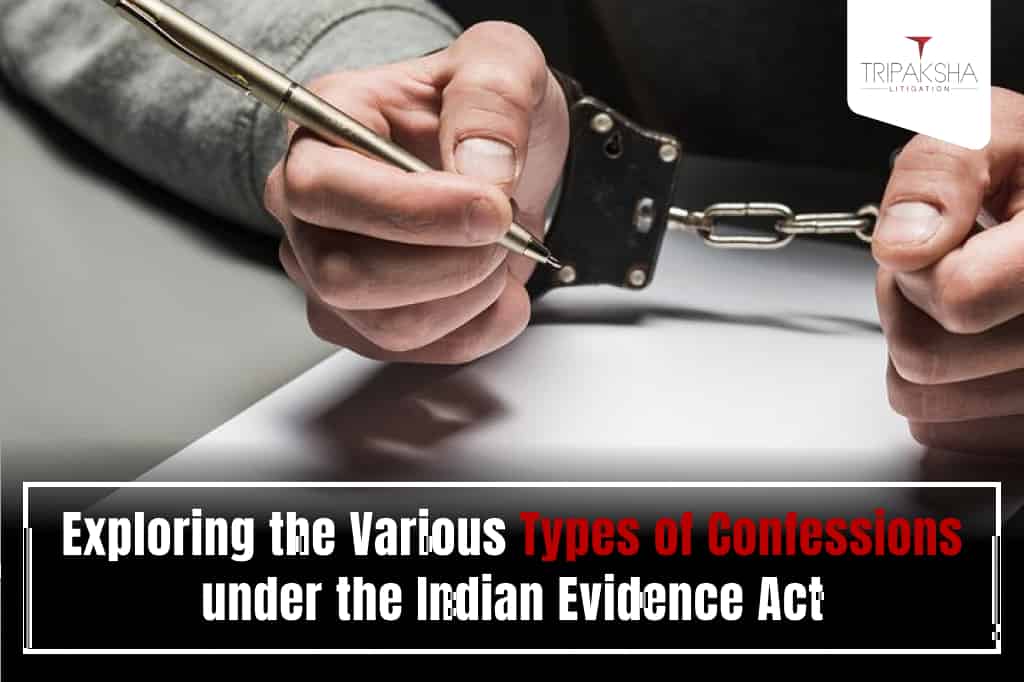Introduction:
Confessions are pivotal components of legal proceedings, representing admissions of guilt by the accused. The Indian Evidence Act, of 1872, meticulously outlines provisions regarding confessions, encompassing various types and their admissibility in court. An in-depth comprehension of these provisions is imperative for legal practitioners and individuals involved in legal processes. This article aims to provide a thorough analysis of the different types of confessions under the Indian Evidence Act, elucidating their legal intricacies and implications.
Types of Confessions:
Judicial Confession
A judicial confession transpires when an accused voluntarily admits guilt before a magistrate or in a court of law. Section 164 of the Indian Evidence Act mandates that confessions made before a magistrate be voluntary and devoid of any coercion, inducement, or promise. Judicial confessions are accorded significant evidentiary weight due to their formal recording by a judicial authority. The magistrate, acting as a neutral arbiter, ensures the voluntariness of the confession and adheres to procedural safeguards, thus upholding the integrity of the confession process.
Extra-judicial Confession
Extra-judicial confessions occur when an accused acknowledges guilt outside the realm of formal judicial proceedings, such as to law enforcement officials, witnesses, or any other unauthorized individuals. While Section 24 of the Indian Evidence Act permits the admission of extra-judicial confessions, their admissibility is contingent upon their voluntariness and the absence of any coercion, inducement, or promise. However, due to the informal nature of these confessions, they necessitate meticulous scrutiny to ascertain their authenticity and reliability, safeguarding against potential coercion or manipulation.
Retracted Confession
A retracted confession emerges when an accused, subsequent to initially admitting guilt, recants or disavows the confession. The Indian Evidence Act acknowledges both the original confession and its retraction, with Section 24 emphasizing that the admissibility of a retracted confession hinges on its voluntariness and the circumstances surrounding its retraction. Courts meticulously evaluate the reliability of retracted confessions, considering factors such as coercion, duress, or false promises, which may have prompted the retraction. Such scrutiny ensures the preservation of the accused’s rights and the integrity of the confession process.
Confession by Co-accused
Confessions made by co-accused individuals constitute another facet of confession-related evidentiary considerations. While these confessions may be admissible under certain circumstances, they are inherently deemed weak evidence and necessitate corroboration by substantial independent evidence to establish guilt beyond a reasonable doubt. The courts meticulously scrutinize confessions by co-accused, ensuring their voluntariness and authenticity, and corroborative evidence serves as a safeguard against potential falsehoods or coerced admissions.
Analysis of Legal Precedents
Legal precedents offer invaluable insights into the interpretation and application of confession-related provisions under the Indian Evidence Act.
In Nishi Kant Jha v. State of Bihar (AIR 1964 SC 205), the Supreme Court underscored the paramount importance of voluntariness in confessions, deeming any confession obtained through inducement, threat, or promise inadmissible. Similarly, in State of Uttar Pradesh v. Deoman Upadhyaya (AIR 1961 SC 1612), the Court affirmed the admissibility of judicial confessions, provided they are voluntary and devoid of coercion.
In Raja Ram v. State of Rajasthan (AIR 1972 SC 263), the Supreme Court reiterated the necessity of corroboration in assessing the reliability of extra-judicial confessions, emphasizing the burden on the prosecution to establish voluntariness and authenticity. The Court, in Sarwan Singh Rattan Singh v. State of Punjab (AIR 1957 SC 637), elucidated the nuanced evaluation of retracted confessions, highlighting the need for caution and scrutiny.
Conclusion:
Confessions serve as crucial evidentiary elements in legal proceedings, shedding light on the culpability of the accused. The Indian Evidence Act meticulously delineates provisions governing various types of confessions, ensuring adherence to principles of voluntariness, authenticity, and procedural fairness. Legal precedents offer invaluable guidance in interpreting and applying these provisions, underscoring the significance of judicial scrutiny and procedural integrity.
By upholding these principles, the legal system safeguards individual rights, promotes transparency, and fosters trust in the administration of justice. An informed understanding of confession-related provisions and their legal ramifications is indispensable for legal practitioners, ensuring equitable outcomes in legal proceedings and upholding the rule of law in society.
You may contact me for consultation or advice by visiting Contact Us and Call us








